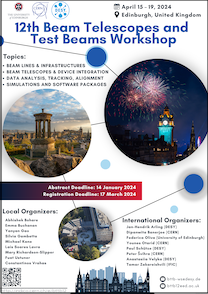Speaker
Description
The J-PARC E16 experiment has the goal to search for signatures of the spontanoeusly broken chiral symmetry and its (partial) restoration, through the study in-medium modification of the vector mesons, particulary the phi meson, decaying via di-electron channel, with a high intensity 30 GeV proton beam interacting with C and Cu targets at rates up to 10 MHz. For this purpose, the experiment will use modules constructed using the same technology and procedures as the modules of the Silicon Tracking System (STS) of the CBM experiment.
A total of 10 modules were assembled, tested, characterized and then; installed in the E16 detector setup. For preparation the detector for the beamtest, we commissioned the detectors by measuring ENC and calibration performance. In the beamtime 3 modules operated and were iluminated by electron beam of 3 GeV momentum.
This work will show the results of commissioning and operation of the E16 modules, as well as the status of the data analysis and the insights that we have gained from it, in view the upcoming series production of STS modules.
